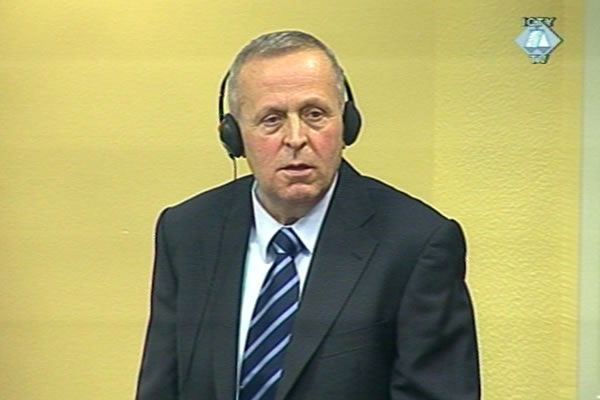Home
PROSECUTION ASKS FOR SEVEN YEARS FOR DELIC
At the appellate hearing in the case of General Rasim Delic, the prosecution asked for a harsher sentence for the former commander of the BH Army General Staff. According to the prosecution, the three-year sentence delivered by the Trial Chamber ‘does not reflect the gravity of the crimes’. Arguing that the prosecution’s request was ‘groundless’, the defense requested Delic’s acquittal
 Rasim Delic in the courtroom
Rasim Delic in the courtroom At the appellate hearing in the Rasim Delic case, the prosecution asked for a harsher sentence, seven years in prison, for the former commander of the BH Army General Staff. The Trial Chamber sentenced Delic to three years for his failure to prevent and punish the Mujahideen’s cruel treatment of captured Serbian soldiers in July and August 1995.
According to the prosecution, the three-year sentence ‘does not reflect the gravity of the crimes’ and the severity of Delic’s failure to prevent and punish members of the El Mujahid Detachment who perpetrated the crimes. The prosecution noted that victims spent 35 days in the atmosphere of ‘constant mental terror’ subjected to ‘serious physical abuse’. Even before those crimes The El Mujahid Detachment was inclined to violence and crime. Delic was informed about that through reports he received, the prosecution argued. Instead of taking appropriate measures, Delic ignored his obligations under international humanitarian law, ‘opting instead to use the military advantage’ the foreign soldiers gave him. Delic even awarded highest military decorations to some of those fighters.
The defense considers the prosecution’s request ‘for such a harsh sentence groundless’. In the defense’s view, the prosecution failed to prove that Delic had had effective control over the El Mujahid Detachment. As Delic’s defense counsel Vasvija Vidovic put it, the prosecution’s claim that Delic had knowledge of the previous criminal conduct of the Mujahideen ‘is not true’. The information that got through to Delic didn’t concern ‘crimes’, but minor infractions that stemmed from cultural differences between the foreign soldiers and the local population. The Trial Chamber concluded that Delic’s knowledge of crimes was ‘indirect’, Vidovic noted.
The defense then noted that the Trial Chamber reached its judgment with a majority of votes. Presiding judge Moloto considered that the prosecution had failed to prove that Delic had had effective control over the El Mujahid Detachment at the time of the crimes. Judges Harhoff and Lattanzi found that Delic’s superiority over the foreign soldiers’ detachment, established on Delic’s orders, had been proven.
As for the decorations for foreign soldiers, the defense argued that the BH Presidency – and not Delic alone – decided to award them. When the international community demanded that the foreign soldiers leave the country after the Dayton peace agreement was signed in December 1995, the issue had to be handled ‘diplomatically’, Vasvija Vidovic said. According to the prosecution, this doesn’t diminish Delic’s responsibility. At that time Delic was a member of the BH Presidency.
[IMAGE]4516[/IMAGE]In his brief address to the Appeals Chamber, Delic said, ‘the trust I’ve had for the International Tribunal since its establishment has remained unchanged despite the Trial Chamber’s sentence’. Delic has already served two thirds of his sentence. After the hearing, Delic will return to BH: he has been released pending the appellate judgment.
Linked Reports
- Case : Delic
- 2008-09-15 THREE YEARS IN PRISON FOR RASIM DELIC
- 2008-06-11 PROSECUTION CALLS FOR 15 YEARS IN PRISON FOR GENERAL DELIC
- 2008-06-10 DEFENSE CALLS FOR GENERAL DELIC’S ACQUITTAL
- 2013-06-21 CALL FOR REVIEW OF RASIM DELIC’S CONVICTION
- 2013-07-04 PROSECUTION: TRIBUNAL IS FOR THE LIVING NOT THE DEAD
